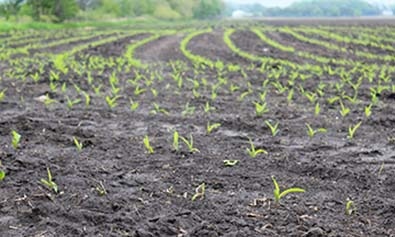
by Lydia Mulvany
Monsanto Co., a lightning rod for critics of modern agricultural techniques, is introducing a new feature next year for its genetically modified corn seeds that it says will not only boost yields but cut down on fertilizer use and carbon-dioxide emissions.
Related: Bayer closes deal on Monsanto for $66 billion
The seed giant, together with Danish company Novozymes A/S, has developed a coating for seeds made from a friendly fungus that helps corn plants in their earliest growth stages.
St. Louis-based Monsanto, which earlier this year agreed to be acquired by Germany’s Bayer AG, is hailing the product as a breakthrough for microbial technology, in which scientists look to fungi and other organisms such as bacteria to help farmers.
Corn crops treated with the new Monsanto-Novozymes microbial -- officially known as Acceleron B-300 SAT -- had better yields than those without the treatment, the companies said in a statement Monday. The product stays on seeds longer and is compatible with other chemical treatments, unlike previous versions. It could be applied to more than 90 million acres (36 million hectares) by 2025.
The seed treatment could “become one of the biggest biological products in the ag industry,” said Colin Bletsky, vice president for Novozymes’ BioAg unit. “Harnessing the power of nature’s microbes, farmers will be able to produce more crops.”
Farmers have been using synthetic chemical treatments for seeds for decades to protect plants from pests as they take root, and it’s a mature industry, Monsanto spokesman John Combest said by phone. Microbial seed treatments, in contrast, are niche products that have only boomed in the past decade, he said. The agricultural microbial market currently has about $1.8 billion in sales, while traditional chemicals and pesticides is a market valued at about $240 billion, Combest said.
The new microbial coating, derived from a fungus called Penicillium bilaiae, works by growing along the roots of plants and helping them to access nitrogen and phosphorus in the soil. In trials, crops using the microbial boosted yields by more than 3 bushels an acre on average, according to the release.
The spores will stay on the seeds for two years. That compares with 120 days for the previous version of the product, called JumpStart, which has meant farmers face a time limit on planting the treated seeds.
Related: Bayer, Monsanto say they will create ‘innovative engine’ for ag
Furthermore, farmers took care of applying JumpStart to seeds themselves, since it wasn’t compatible with traditional chemical treatments, including insecticides and fungicides. Now, Monsanto says it can include the microbial along with other coatings before shipping them to retailers and farmers.
To contact the reporter on this story: Lydia Mulvany in Chicago at [email protected]
To contact the editors responsible for this story: Simon Casey at [email protected]
Will Wade
© 2016 Bloomberg L.P
About the Author(s)
You May Also Like




